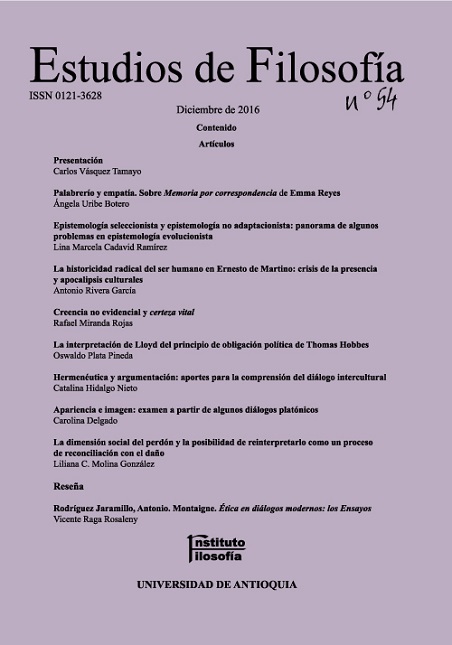Verbiage and empathy. On Memory by Correspondence by Emma Reyes
DOI:
https://doi.org/10.17533/udea.ef.n54a02Keywords:
Empathy, verbiage, immortality ideologies, Sheets-Johnstone, Edith Stein, Edmund Husserl, Emma ReyesAbstract
The purpose of this paper is to deepen into the sense of isolation in a convent in which Emma Reyes, the author of the book Memoria por correspondencia was forced to live. Taking account of Maxine Sheets- Johnstone's term ''immortality ideologies'', in the first part of the paper I try to disclose what I see as the origin of that isolation. In the second part, I weave a relation between the way the immortality ideology is instantiated in that convent and the term ''empathy'', as used in phenomenology. I conclude showing how empathy can be impoverished as to the point where the particularities of an other's experiences are perceived only in a marginal and peripheral way.
Downloads
References
Bonnet, P. (2014). “Prólogo”, en: Reyes, E. Memoria por correspondencia, Bogotá: Fundación Arte Vivo Otero Herrera/Laguna Libros, pp. 9-12.
Deas, M. (2014). “Nota”, en: Reyes, E. Memoria por correspondencia, Bogotá: Fundación Arte Vivo Otero Herrera/Laguna Libros, pp. 13-14.
Husserl, E. (1980). Experiencia y juicio. UNAM: México.
Husserl, E. (1991). La crisis de las ciencias europeas y la fenomenología trascendental. Barcelona: Editorial Crítica.
Husserl, E. (2009). Meditaciones cartesianas, Madrid: Tecnos.
Moran, D. (2000). Introduction to Phenomenology. London and New York: Routledge.
Moran, D. & Cohen, J. (2012). The Husserl Dictionary. New York: Continuum Philosphy Dictionaries.
Otero, J. C. (2014). “Presentación”, en: Reyes, E. Memoria por correspondencia, Bogotá: Fundación Arte Vivo Otero Herrera/Laguna Libros, pp. 7-8.
Reyes, E. (2014). Memoria por correspondencia, Bogotá: Fundación Arte Vivo Otero Herrera/Laguna Libros.
Sheets-Johnstone, M. (2008). The Roots of morality. Pennsylvania: The Pennsylvania State University Press.
Stein, E. (2004). Sobre el problema de la empatía. Madrid: Trotta.
Zahavi, D. (2003). Husserl ́s Phenomenology. California: Stanford University Press.
Zahavi, D. (2014). Self, Other and Shame. Exploring Subjectivity, Empathy and Shame. Oxford U.K.: Oxford University Press.
Published
How to Cite
Issue
Section
Categories
License
Copyright (c) 2016 Ángela Uribe Botero

This work is licensed under a Creative Commons Attribution-NonCommercial-ShareAlike 4.0 International License.
Authors who publish with this journal agree to the following terms:
1. The Author retains copyright in the Work, where the term "Work" shall include all digital objects that may result in subsequent electronic publication or distribution.
2. Upon acceptance of the Work, the author shall grant to the Publisher the right of first publication of the Work.
3. The Author shall grant to the Publisher a nonexclusive perpetual right and license to publish, archive, and make accessible the Work in whole or in part in all forms of media now or hereafter known under a Creative Commons Attribution-NoCommercia-ShareAlike (CC BY-NC-SA 4.0), or its equivalent, which, for the avoidance of doubt, allows others to copy, distribute, and transmit the Work under the following conditions: (a) Attribution: Other users must attribute the Work in the manner specified by the author as indicated on the journal Web site;(b) Noncommercial: Other users (including Publisher) may not use this Work for commercial purposes;
4. The Author is able to enter into separate, additional contractual arrangements for the nonexclusive distribution of the journal's published version of the Work (e.g., post it to an institutional repository or publish it in a book), as long as there is provided in the document an acknowledgement of its initial publication in this journal;
5. Authors are permitted, and Estudios de Filosofía promotes, to post online the preprint manuscript of the Work in institutional repositories or on their Websites prior to and during the submission process, as it can lead to productive exchanges, as well as earlier and greater citation of published work (see The Effect of Open Access). Any such posting made before acceptance and publication of the Work is expected be updated upon publication to include a reference to the Estudios de Filosofía's assigned URL to the Article and its final published version in Estudios de Filosofía.















